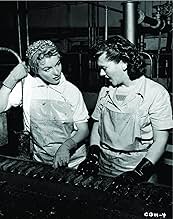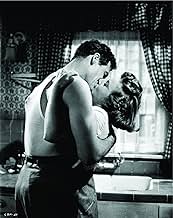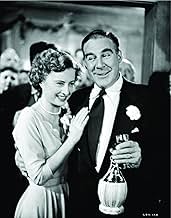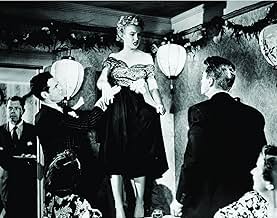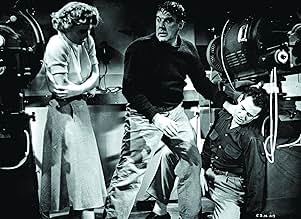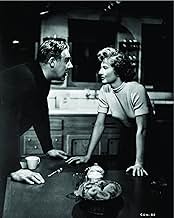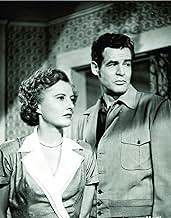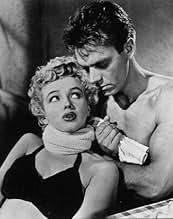VALUTAZIONE IMDb
7,0/10
7958
LA TUA VALUTAZIONE
Mae Doyle torna nella sua città natale diventata una cinica. Suo fratello Joe teme che la sua amante Peggy finirà come lei. Mae sposa Jerry e ha un bambino: è felice ma nervosa, attratta da ... Leggi tuttoMae Doyle torna nella sua città natale diventata una cinica. Suo fratello Joe teme che la sua amante Peggy finirà come lei. Mae sposa Jerry e ha un bambino: è felice ma nervosa, attratta da Earl, l'amico di Jerry.Mae Doyle torna nella sua città natale diventata una cinica. Suo fratello Joe teme che la sua amante Peggy finirà come lei. Mae sposa Jerry e ha un bambino: è felice ma nervosa, attratta da Earl, l'amico di Jerry.
- Premi
- 3 vittorie totali
William Bailey
- Waiter
- (non citato nei titoli originali)
Harry Baum
- Restaurant Patron
- (non citato nei titoli originali)
Dan Bernaducci
- Guest
- (non citato nei titoli originali)
Albert Cavens
- Restaurant Patron
- (non citato nei titoli originali)
Dick Cherney
- Fisherman
- (non citato nei titoli originali)
Charles Cirillo
- Restaurant Patron
- (non citato nei titoli originali)
Irene Crosby
- Guest
- (non citato nei titoli originali)
Russell Custer
- Fisherman
- (non citato nei titoli originali)
Tony Dante
- Fisherman
- (non citato nei titoli originali)
Roy Darmour
- Man
- (non citato nei titoli originali)
Recensioni in evidenza
The subheading in the IMDb page for "Clash by Night" calls this film noir. Many fans of the genre may be disappointed. It does have one of the great film noir directors in Fritz Lang and stars two of the genres foremost performers in Barbara Stanwyck(DOUBLE INDEMNITY) and Robert Ryan(The Set Up). However, the style is more romantic drama than film noir. It reminds me of the filmed plays by Elia Kazan like "A Streetcar Named Desire". It even has a character screaming a name out the window. I guess the crime element is missing here but I guess infidelity would fit. The dialogue is up to the standard you'd expect a luminary like Clifford Odets to create. I was unsure if I would agree with the way the film ended but the characterization and plot were so well done, I knew that the ending would not disappoint. I was right.
Why did Fritz Lang want to make this movie? Did he select the cast? "Clash by Night" was part of the recent TCM tribute to Lang, and following after the early European masterpieces, "Metropolis," and "M," one wonders how much Lang modified and compromised his early filmmaking ideals and style in resettling in Hollywood and jockey for financial support. I've not seen or read the original Odets play on which the film is based, but whatever Lang's reason for choosing it, one has to ask how the finished movie fits into Lang's output, especially the stark, powerful, stylized early pieces. A couple of features stand out: Lang always had a message-- nothing was mere observation -- that shaped the plot and characters' motivations. If Good and Evil stand out too sharply in black and white terms, Lang is still intent on sharp analysis of the turns and twists on the road to Good or Evil. Forces beyond individual characters' control are harnessed and made part of the characters motivations. Then Lang sets them on their inevitable course, and we watch, sometimes in shock or agony.
In "Clash," the imagery-- contrasting shots of sea, clouds, birds,etc, register his endorsement of the natural order of things as Good. In Metropolis, the natural order of humanity toward others was stamped out by the drive for materialism and industrial supremacy, Evil (historically predicating Nazism), symbolized always by the grinding and spouting machinery. All of the characters are tuned to a high pitch and respond with intensity. Lang's style of directing brought out the extremes -- the fortissimos-- in his actors, no matter whom he cast. Lang must have been an extraordinarily demanding director to elicit such razor-edge performances from his actors.
The fact that all the actors in "Clash" are familiar to us from other films meant Lang had to pit them against each other to an even keener degree. They are all desperate for something, whether they reveal it on the surface or not. For an actress like Stanwyck, this was an easily achieved emotional state, and she had to accept the concept of "aging" in her role. If anything, Lang forced her to keep her hard edges up a bit too much, allowing some softening only in the rather quick ending. This bit of character transformation happens only after she sees the true desperation that she's driven Paul Douglas to in the final scene in the film room.
Ah, yes, the film room. If that isn't an obvious set piece, I don't know what is. Ryan, as the third wheel, runs the projectors. Much of his dialogue is double-edged. And Ryan's character is the most desperate, the least yielding, even to Stanwyck, making his profession as a film projectionist ironic and something artificial, compared to the "natural" metier of Douglas and his father's as fishermen. They draw on the bounty of nature and so symbolize -- purposely and obviously -- pure goodness in human nature. Douglas gives a generous, sweet-tough-guy performance that is Ryan's match. Douglas never guesses what temptation he presents to his wife Stanwyck when he casually invites his best friend to stay with them. This generosity extends in particular to his overlooking faults, whether of his leeching uncle or his friend's sarcstic selfishness.
The role of the father, as a link to the Old Country and its solid gold ways is well-placed. His speech at the wedding puts his character in a nutshell: God made love, God made wine, God made friends, let everyone enjoy them, or some such pithy message. For a filmmaker like Lang, and other transplanted Europeans, the sacrifice of deep roots of their heritage and language could only be compensated for by an equally deep absorption of the customs and values of the New Country. Emigré geniuses like Lang, Wilder, or von Stroheim, never left anything behind, they reabsorbed and refashioned their material through their sharp perception of human nature in this new context. I think that is why we feel this movie to be beyond mere melodrama. I couldn't stop watching it -- the characters caught me in their predicament: they reach a universal dimension in the very simplicity and obviousness of their situations and temptations. Lang's role was to push them to that level recognition in themselves.
Even the seemingly secondary characters like Stanwyck's brother and his girlfriend, the latter played surprisingly and delightfully by a young Marilyn Monroe, give strong performances. Marilyn already shows her subtlety and emotional vulnerability. Her spontaneous response to Stanwyck's return to her brother's apartment at the beginning revealed a genuine charm, and she provided a needed sparkle in this otherwise grim film.
So why see "Clash"? Even a secondary work by a master bears his mark, and to see the mark and its features in the context of film history is still a worthwhile effort.
Of Four ****, three ***.
In "Clash," the imagery-- contrasting shots of sea, clouds, birds,etc, register his endorsement of the natural order of things as Good. In Metropolis, the natural order of humanity toward others was stamped out by the drive for materialism and industrial supremacy, Evil (historically predicating Nazism), symbolized always by the grinding and spouting machinery. All of the characters are tuned to a high pitch and respond with intensity. Lang's style of directing brought out the extremes -- the fortissimos-- in his actors, no matter whom he cast. Lang must have been an extraordinarily demanding director to elicit such razor-edge performances from his actors.
The fact that all the actors in "Clash" are familiar to us from other films meant Lang had to pit them against each other to an even keener degree. They are all desperate for something, whether they reveal it on the surface or not. For an actress like Stanwyck, this was an easily achieved emotional state, and she had to accept the concept of "aging" in her role. If anything, Lang forced her to keep her hard edges up a bit too much, allowing some softening only in the rather quick ending. This bit of character transformation happens only after she sees the true desperation that she's driven Paul Douglas to in the final scene in the film room.
Ah, yes, the film room. If that isn't an obvious set piece, I don't know what is. Ryan, as the third wheel, runs the projectors. Much of his dialogue is double-edged. And Ryan's character is the most desperate, the least yielding, even to Stanwyck, making his profession as a film projectionist ironic and something artificial, compared to the "natural" metier of Douglas and his father's as fishermen. They draw on the bounty of nature and so symbolize -- purposely and obviously -- pure goodness in human nature. Douglas gives a generous, sweet-tough-guy performance that is Ryan's match. Douglas never guesses what temptation he presents to his wife Stanwyck when he casually invites his best friend to stay with them. This generosity extends in particular to his overlooking faults, whether of his leeching uncle or his friend's sarcstic selfishness.
The role of the father, as a link to the Old Country and its solid gold ways is well-placed. His speech at the wedding puts his character in a nutshell: God made love, God made wine, God made friends, let everyone enjoy them, or some such pithy message. For a filmmaker like Lang, and other transplanted Europeans, the sacrifice of deep roots of their heritage and language could only be compensated for by an equally deep absorption of the customs and values of the New Country. Emigré geniuses like Lang, Wilder, or von Stroheim, never left anything behind, they reabsorbed and refashioned their material through their sharp perception of human nature in this new context. I think that is why we feel this movie to be beyond mere melodrama. I couldn't stop watching it -- the characters caught me in their predicament: they reach a universal dimension in the very simplicity and obviousness of their situations and temptations. Lang's role was to push them to that level recognition in themselves.
Even the seemingly secondary characters like Stanwyck's brother and his girlfriend, the latter played surprisingly and delightfully by a young Marilyn Monroe, give strong performances. Marilyn already shows her subtlety and emotional vulnerability. Her spontaneous response to Stanwyck's return to her brother's apartment at the beginning revealed a genuine charm, and she provided a needed sparkle in this otherwise grim film.
So why see "Clash"? Even a secondary work by a master bears his mark, and to see the mark and its features in the context of film history is still a worthwhile effort.
Of Four ****, three ***.
clash by night is a great example of what a difference great acting can make. those were the days! story is full of usual cliches, but stanwyck, paul douglas, robert ryan, and a young marilyn monroe: wow!!! and it shows how sexy a film can be without any "sex scenes" or even a hint of nudity.
CLASH BY NIGHT is a melodrama that betrays its stageplay origins with some artful but sometimes arty dialogue that attempts to get us beneath the skin of its three main characters--and occasionally does. But it's a tribute to the acting skill of Stanwyck, Paul Douglas and Robert Ryan that their characters come alive with all their flaws and longings exposed.
Barbara is excellent as a woman who returns to a fishing village after a long time away, a bitter, defeated woman still trying to find a niche for herself. Paul Douglas does a remarkably fine job as a good-hearted man, simplistic in nature, who latches onto her only to have her betray him with the lusty Robert Ryan. Lookers on include two very interesting performers--Keith Andes and Marilyn Monroe (on her way up). Andes breathes life into the role of Barbara's disgruntled brother and should have been groomed for stardom--he had the looks and appeal of a major star.
A somewhat downbeat ending resolves the conflict--but along the way there are some very high-strung moments from Stanwyck that she plays to perfection. Marilyn Monroe demonstrates talent in a minor role.
A bit talky and stagebound in some scenes--but an interesting melodrama thanks mainly to the gripping performances of Stanwyck, Douglas and Ryan. Ryan would have made a great Stanley Kowalski in 'Streetcar' based on his drunk scene in this one. He can play a brute about as well as anyone and here he's quite an actor, matching Stanwyck's intense performance with a sturdy one of his own.
Barbara is excellent as a woman who returns to a fishing village after a long time away, a bitter, defeated woman still trying to find a niche for herself. Paul Douglas does a remarkably fine job as a good-hearted man, simplistic in nature, who latches onto her only to have her betray him with the lusty Robert Ryan. Lookers on include two very interesting performers--Keith Andes and Marilyn Monroe (on her way up). Andes breathes life into the role of Barbara's disgruntled brother and should have been groomed for stardom--he had the looks and appeal of a major star.
A somewhat downbeat ending resolves the conflict--but along the way there are some very high-strung moments from Stanwyck that she plays to perfection. Marilyn Monroe demonstrates talent in a minor role.
A bit talky and stagebound in some scenes--but an interesting melodrama thanks mainly to the gripping performances of Stanwyck, Douglas and Ryan. Ryan would have made a great Stanley Kowalski in 'Streetcar' based on his drunk scene in this one. He can play a brute about as well as anyone and here he's quite an actor, matching Stanwyck's intense performance with a sturdy one of his own.
Barbara Stanwyck is so good at playing rough-hewn women--characters with a cynical edge--that it's easy to take her presence here for granted. Once again, she's remarkably fine cast as a tough cookie returning to her hometown along the waterfront and eventually reuniting with her estranged brother. Meanwhile, Marilyn Monroe is fun as a sassy local girl (although her lines sound as if they were looped in post-production) and Paul Douglas is terrific as usual playing a lovestruck skipper. Tempestuous melodrama from director Fritz Lang is decent fare, with heated emotions and florid dialogue, but perhaps more subtlety and nuance would've made it a more memorable picture. **1/2 from ****
Lo sapevi?
- QuizThis movie was shot while Barbara Stanwyck was in the process of divorcing Robert Taylor. The movie also features the rising young star Marilyn Monroe. Barbara gives a good performance in one of her most memorable films. Despite her emotional devastation due to the divorce, the crew noted Stanwyck's lack of a diva tantrum. Fritz Lang later said, "She's fantastic, unbelievable, and I liked her tremendously. When Marilyn missed her lines - which she did constantly - Barbara never said a word."
- BlooperWhile at the tavern, Mae and Jerry watch the moon rise over the ocean. The film takes place in Monterey, California, which is on the West coast, where the moon rises over the hills and sets on the ocean.
- Curiosità sui creditiand introducing Keith Andes
- ConnessioniEdited into Les Amoureux du cinéma (1987)
- Colonne sonoreI Hear a Rhapsody
Written by George Fragos (uncredited), Jack Baker (uncredited) and Dick Gasparre (uncredited)
Sung by Tony Martin
I più visti
Accedi per valutare e creare un elenco di titoli salvati per ottenere consigli personalizzati
- How long is Clash by Night?Powered by Alexa
Dettagli
Botteghino
- Lordo in tutto il mondo
- 62 USD
- Tempo di esecuzione1 ora 45 minuti
- Colore
- Proporzioni
- 1.37 : 1
Contribuisci a questa pagina
Suggerisci una modifica o aggiungi i contenuti mancanti

Divario superiore
What is the Japanese language plot outline for La confessione della signora Doyle (1952)?
Rispondi

